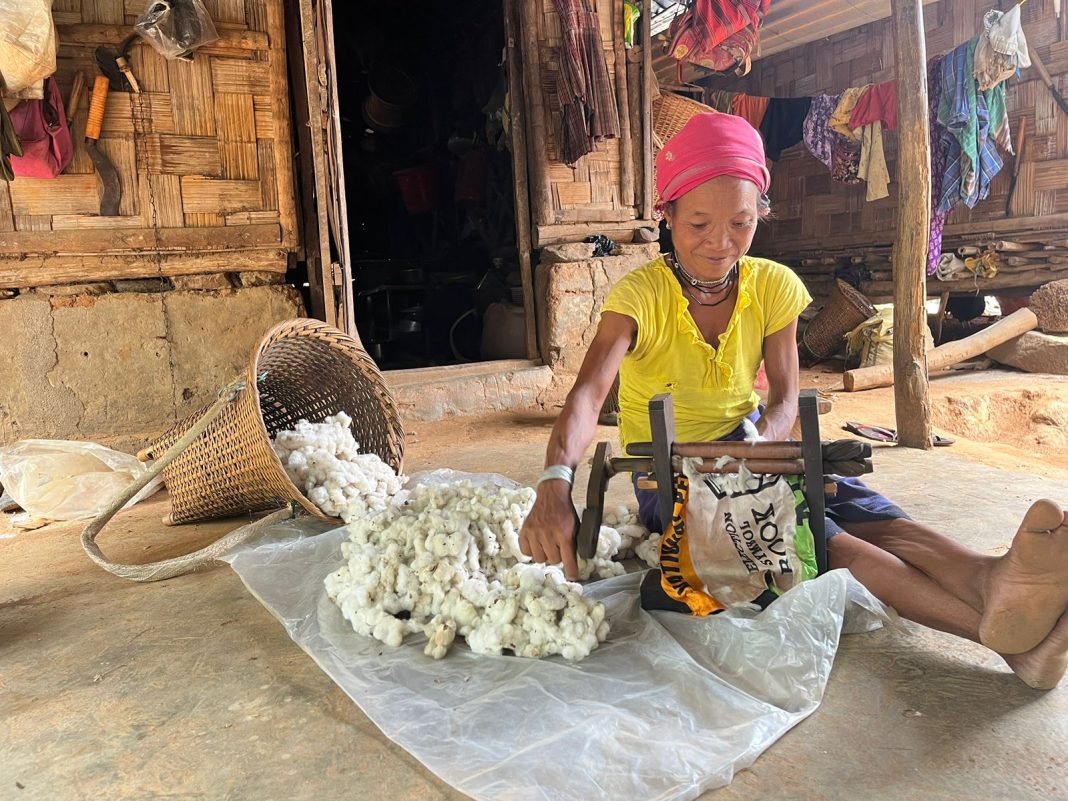By Roopak Goswami
Shillong, Oct 25: From making earbuds to sanitary napkins which can be produced without using Super Absorbent Polymers, Comilla cotton which was marketed during the pre-independence era in the Comilla district of present-day Bangladesh is trying its best to retain its glory.
Garo Hills in Meghalaya is home to a unique variety of cotton, Gossypium arboreum, known locally as Comilla cotton. This species, traditionally marketed during the pre-independence era in the Comilla district of present-day Bangladesh, is celebrated for its resilience and its suitability for surgical cotton.
Unlike other varieties of G. arboreum, Comilla cotton has distinct traits, including large bracts, elongated capsules, and large bolls (6–8 grams), with excellent boll retention and ginning efficiency of up to 50%. It is also naturally resistant to biotic and abiotic stresses. The cotton’s high absorbency and short-staple fibre make it ideal for medical purposes, making it a highly sought-after variety in the surgical cotton industry.
However, its production, productivity, and market supply have declined in recent years due to multiple production and marketing constraints. As of 2014-2015, the average annual area under Comilla cotton cultivation in Meghalaya was approximately 7,512 hectares, producing around 5,887 bales. It is typically grown under the slash and burn system, also known as “jhum cultivation”.
Despite its unique qualities, there has been little research or systematic effort to improve the race cernuum. Traits like big boll size and high ginning efficiency, which are prized in this cotton variety, have been transferred to other species of cotton, but direct improvement of cernuum itself has been largely overlooked.
With the surgical cotton industry in India requiring 3.40 lakh metric tonnes of raw cotton annually, there is a renewed push to revive Comilla cotton. The high absorbency, short-staple length, and organic cultivation methods make it an ideal candidate to meet the growing demand.
The Need for Modern Intervention: Things have changed now and Comilla cotton is undergoing a remarkable makeover, with traditional cultivation practices being modernized through crop improvement initiatives and the development of value-added products such as eco-friendly earbuds and sustainable sanitary napkins, creating new opportunities for farmers and entrepreneurs alike.
“Comilla Cotton is a valuable indigenous resource that can play a vital role in improving the livelihoods of the NE region. The fibre has excellent potential for medical textile products. Bio-based eco-friendly products need to be designed and popularized” Jyoti V Vastrad, Dean, College of Community Sciences, Central Agricultural University (Imphal), Tura told TME.
The ICAR-Central Institute of Cotton Research(CICR) Nagpur and the College of Community Sciences, Central Agricultural University(Imphal) Tura have joined hands to address the challenges faced by Comilla cotton farmers by crop improvement to enhance its productivity and fibre quality. The aim is to develop high-yielding cultivars that retain Comilla cotton’s unique traits while improving its suitability for industrial use, particularly in the surgical cotton sector.
The plans include modernizing the ginning process, establishing community seed banks, and conducting research on the crop’s diversity. Efforts are also being made to connect smallholder farmers with surgical cotton industries to enhance market access and boost incomes.
“ A number of training programmes have been held on Comilla cotton product development and on crop improvement. ” We wish to expand the area of cultivation and foster enterprises for the benefit of farmers and rural women and youth,” Jyoti said.
ECO-FRIENDLY INNOVATIONS: Interestingly, one self-help group in the village of Darechigre in Garo Hills has taken the lead in manufacturing eco-friendly earbuds. Plans are underway to expedite the sterilization, packaging, and marketing of these products locally and through e-commerce platforms, opening up new economic opportunities for smallholder farmers and local entrepreneurs.
Indigenous scouring and bleaching technology has been created to make Comilla cotton suitable for surgical use. This technology, which has been transferred to local villagers, ensures the cotton meets the required standards for medical applications. Once bleached, the cotton is being used to create eco-friendly products, such as earbuds, which are produced in accordance with BIS standards.
In addition to earbuds, experimentation on production of SAP free sanitary napkins is in progress. Thanks to its high absorbency, these sanitary napkins can be produced without using Super Absorbent Polymers (SAP), which is the cause for increasing cervical cancer cases. This further enhances the potential of Comilla cotton to generate value-added products that benefit both the environment and local communities.






